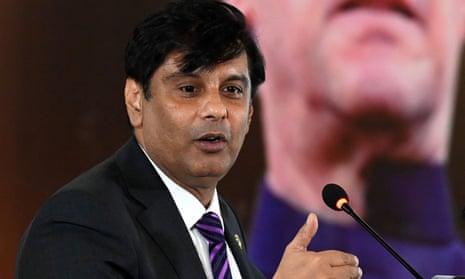
Arshad Sharif left Pakistan after facing months of harassment - Aamir Qureshi/AFP/Getty Images
Arshad Sharif Killed by Police in Kenya ‘Was Case of Mistaken Identity’
By Caroline Kimeu in Nairobi and Shah Meer Baloch in Islamabad
Kenya’s national police service has said it regretted the killing of a Pakistani journalist who had been living in hiding in the country and was shot dead in Nairobi in an incident it described as a case of mistaken identity.
Officers opened fire on Arshad Sharif, 50, and a friend on Sunday after they allegedly drove through a security roadblock outside the Kenyan capital.
The officers shot at the car nine times, hitting Sharif in the head. They were on the lookout for a similar vehicle, which they claim had been linked with a child kidnapping case, according to police accounts.
“They did not stop and proceeded with the journey,” the force said on Monday. Police opened fire and gave chase, during which the car flipped over.
Sharif’s killing has raised suspicions of foul play among observers, politicians and the press. The journalist, who was a fierce critic of the Pakistani government, fled the country in August after allegedly receiving death threats over his work. His whereabouts were not publicly known. Most of his friends knew only that he had spent time in Dubai and London.
Pakistan’s prime minister, Shehbaz Sharif, tweeted he had called Kenya’s president, William Ruto, on Monday afternoon and requested an investigation into what he said was a shocking incident.
Pakistan’s high commissioner in Kenya said it was also in touch with the Kenyan police authorities and foreign ministry over the matter.
The force’s use of lethal violence has drawn concern both nationally and internationally. Kenya has grappled with police killings and brutality for years. Missing Voices Kenya , an organization that monitors killings by police, has recorded more than 1,286 such cases since 2007, and 100 this year alone.
Kenya’s Independent Policing Oversight Authority (IPOA), which investigates police misconduct, has opened an investigation into the journalist’s killing. Some IPOA investigations, however, have dragged on for years and a number remain open.
The Foreign Press Association of Africa released a statement saying it was “deeply disturbed” over the killing and called on the Kenyan government to “fully and conclusively investigate the incident” and “unravel the mystery” behind Sharif’s death.
His, wife Javeria Siddique, told Pakistani media that he had been facing harassment for months. He “did not even disclose the name of the country in Africa where he had moved to because of security threats”, she said.
Shireen Mazari, a former human rights minister in Pakistan, tweeted : “Let there be no confusion, Arshad Sharif was murdered by a sniper bullet to his head. It was not an accident as is now being floated.” She presented no evidence to back up her claim.
Sharif, who was once close to the military establishment, became one of its fiercest critics this year. ARY Network, one of the largest channels in Pakistan, which Sharif worked with, was taken off air after his show was accused of fanning “anti-military sentiment”. The channel later announced that it was parting ways with him amid suspicions of pressure from the military.
A court in Islamabad asked Pakistan’s intelligence agency and police in August to stop harassing Sharif after he lodged a petition through his lawyer saying the security forces were violating his fundamental rights. Police and government sources confirmed at the time that he was being sought in a complaint case but said no action had been carried out to arrest him.
Pakistan has long been unsafe for journalists. It ranked ninth on the Committee to Protect Journalists’ 2020 global impunity index, an annual assessment of countries where journalists are regularly killed, and the assailants go free. – The Guardian

